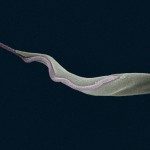Link to Pubmed [PMID] – 2469731
J. Immunol. 1989 Jun;142(11):4017-21
The utilization of the nine major homology families of VH-genes was quantitated in the B lymphocyte response to Trypanosoma cruzi infection of C57BL/6 mice. Normal and infected mice at various times after parasite inoculation were compared for VH-gene distribution of CFU-B produced by activated blasts recovered from spleen and lymph nodes, and for relative hybridization of total spleen RNA with each of the family probes. T. cruzi infection results in large increases of splenic RNA in the various homology families, and the numbers of activated CFU-B, reflecting the massive B lymphocyte responses. In acute phase, all nine families are expressed in roughly the same proportions as in normal mice, whereas in chronic infection, B cells expressing S107 and 7183 VH-genes might be preferentially stimulated. These results establish the polyclonal nature of the host response to T. cruzi infection.

